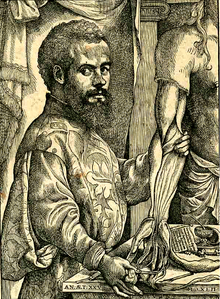Vesalius
| Andreas Vesalius | |
|---|---|

A portrait of Vesalius from De humani corporis fabrica
|
|
| Born |
31 December 1514 Brussels, Habsburg Netherlands (modern-day Belgium) |
| Died | 15 October 1564 (aged 49) Zakynthos, Venetian Ionian Islands (modern-day Greece) |
| Fields | Anatomy |
| Alma mater |
University of Leuven (no degree) University of Paris (no degree) University of Pavia University of Padua (M.D., 1537) |
| Thesis | Paraphrasis in nonum librum Rhazae medici Arabis clarissimi ad regem Almansorem, de affectuum singularum corporis partium curatione (1537) |
| Doctoral advisor |
Johannes Winter von Andernach Gemma Frisius |
| Doctoral students | Matteo Realdo Colombo |
| Known for | De humani corporis fabrica or "the structure of the human body" |
| Influences |
Galen Jacques Dubois Jean Fernel |
| Influenced | Gabriele Falloppio |
Andreas Vesalius (31 December 1514 – 15 October 1564) was a 16th-century Flemish/Netherlandish anatomist, physician, and author of one of the most influential books on human anatomy, De humani corporis fabrica (On the Fabric of the Human Body). Vesalius is often referred to as the founder of modern human anatomy. He was born in Brussels, which though now part of Belgium, was then part of the Habsburg Netherlands. He was professor at the University of Padua and later became Imperial physician at the court of Emperor Charles V.
Andreas Vesalius is the Latinized form of the Dutch Andries van Wesel. It was a common practice among European scholars in his time to Latinize their names. His name is also given as Andrea Vesalius, André Vésale, Andrea Vesalio, Andreas Vesal, André Vesalio and Andre Vesalepo.
Vesalius was born as Andries van Wesel to his father Anders van Wesel and mother Isabel Crabbe on 31 December 1514 in Brussels, which was then part of the Habsburg Netherlands. His great grandfather, Jan van Wesel, probably born in Wesel, received a medical degree from the University of Pavia and taught medicine in 1528 at the University of Leuven. His grandfather, Everard van Wesel, was the Royal Physician of Emperor Maximilian, while his father, Anders van Wesel, served as apothecary to Maximilian, and later valet de chambre to his successor Charles V. Anders encouraged his son to continue in the family tradition, and enrolled him in the Brethren of the Common Life in Brussels to learn Greek and Latin prior to learning medicine, according to standards of the era.
...
Wikipedia
